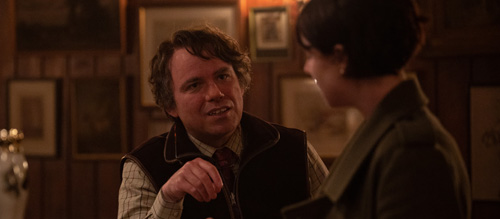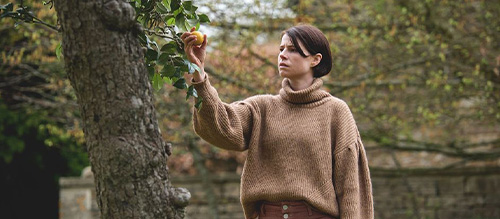Men (2022)
Director: Alex Garland
Screenwriter: Alex Garland
Starring: Jessie Buckley, Rory Kinnear, Paapa Essiedu, Gayle Rankin, Sarah Twomey, Zak Rothera-Oxley, Sonoya Mizuno
Men, or as it should have been titled, ‘Grass-lighting’, sees Alex Garland attempt what is best described as an M.R. James story directed by Darren Aronofsky. We take Jessie Buckley’s Harper, give her an insane amount of trauma at witnessing her husband (Paapa Essiedu) fall to his death, put her in a little English country village with odd-ball characters with misogynistic tendencies, and then throw the entire folk-horror symbolism bible at her to see what happens.
What happens is tense, disturbing, and filled with more metaphors than your English teacher’s poetry lessons. Garland, who definitely knows his horror after writing films such as 28 Days Later and Sunshine, has crafted a unique experience which both pays homage to its predecessors (there are nods to The Wicker Man aplenty, but also little details such as a reference to the 1972 ‘A Ghost Story for Christmas’ adaptation of “A Warning to the Curious”), whilst planting its roots firmly in 21st century gender political discussions. The usual jump scares are, for the most part, out of the window, and instead both the use of silhouettes and dramatic irony are, in combination with exquisite timing on the editing from Jake Roberts, the main tools for building suspense, almost all of which are done marvellously well.
Everyone puts their heart and soul into the acting. Jessie Buckley and Rory Kinnear are utterly stellar, with Buckley bringing a wonderful performance of a woman barely holding everything together, and Kinnear managing to be just the right amount of strange to seem exactly like someone you might know. The lighting and cinematography gives the film that deeply English woodland feel, and the sound design, with the occasional rumble in the background at just the right moment, subtly adds that extra ratchet of tension.
However, the final act tries to be both simplistic and symbolic, clear and yet obscure. It gets its academia in by using the importance of fertility and rebirth in ancient traditions and belief systems, channelled through the folk horror sub-genre, to suggest the importance of a return to a Celtic worshipping of the female as ‘Mother’ Earth. In doing so it dispatches of the corrupted impression modern man has of the role of women in society. Yes, very clever, well done to your book-learning and plotting and planning. Unfortunately, it’s done in such a visually impressive but emotionally-empty fashion that it doesn’t feel as if Garland has any special desire for any of his symbols or allegories or metaphors; he just adds more and more, because more is fancy and serious and proper filmmaking.

So much of the film is spent suggesting ‘aren’t we subtle and clever?’, trying to be creepy but intellectual, that it comes off as someone desperate to try and make a ‘serious’ folk-horror film. It’s as if someone challenged Garland that he couldn’t make a horror movie with so much symbolism that you’d get bored of it, and he took up the mantle. Like so many aspects of the film, its messages and ideas seem to shift and change and morph as time goes on. It’s ok to have complex ideas to demonstrate throughout your feature – if you’ve got the chance, go for it; we applaud the effort – but make sure you don’t get lost in your own allegorical orchard along the way.
Men is one hell of a trip. It’s not trying to follow the rulebook; instead it greedily grabs hold of any and every idea going and swallows them whole, regurgitating it back out onto the screen, raising questions without ever being sure if it has any answers. In terms of cinema, of genre, of pure filmmaking, it’s a godsend. Intellectually, it might also be a godsend, but it could also be a void of nothingness masquerading behind a plastic mask of nightmarish imagery and political discourse. Nothing is quite what it seems.
Score: 17/24


